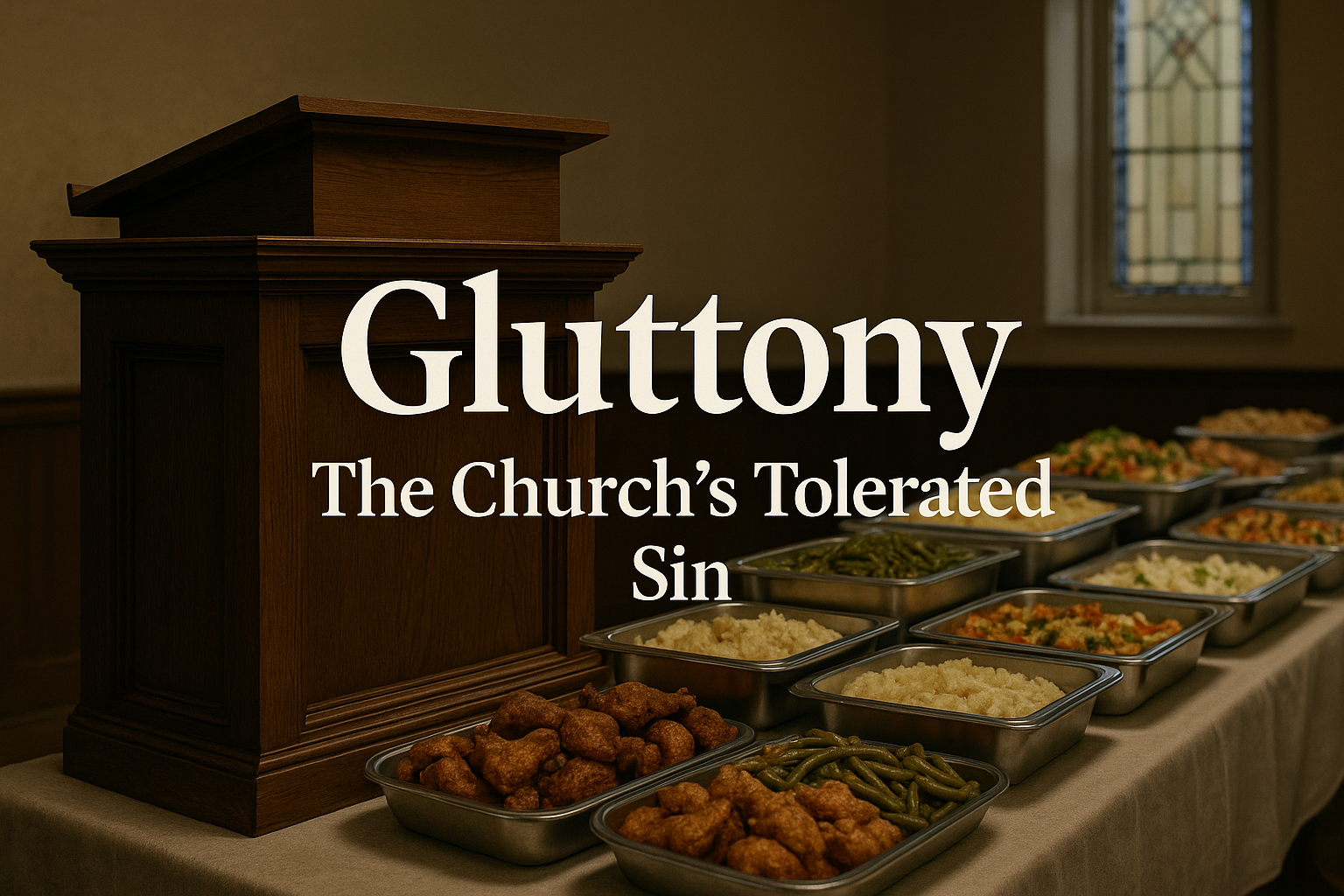⏱️ Estimated Reading Time: 4 min read
Gluttony, The Church’s Tolerated Sin
By Drew von Neida
“Their god is their belly, and they glory in their shame, with minds set on earthly things.”
Philippians 3:19
The Neglected Sin
It is the sin many pulpits ignore, perhaps because it is the one most visible behind the pulpit. You can hear a man thunder against the moral decay of a nation, lament the loss of biblical manhood, and cry out against the idols of our culture, all while his own god is his plate, and his altar is the buffet line.
Gluttony is the tolerated sin of the church. In fact, it is often the applauded one. Jokes about food, about going back for seconds, about the size of a preacher’s portions or waistline are treated as charming, harmless quirks. But Scripture is plain. The Word of God calls gluttony what it is, sin. A fruit of indulgence, not of the Spirit.
What Gluttony Is and Isn’t
Gluttony is not simply being overweight. Nor is it the same as enjoying food with thankfulness, 1 Timothy 4:4–5. Gluttony is the unrestrained indulgence of appetites.
Proverbs 23:20–21 warns against those who overindulge, reminding us it leads to ruin. 1 Corinthians 6:12 declares that while many things may be lawful, we must not be dominated by anything.
Gluttony happens when food ceases to be a gift received with gratitude and becomes a master we cannot say no to. It is when we eat not because we need, but because we crave. And when men called to mortify the flesh are instead mastered by it, it weakens their credibility and clouds their witness.
Why It Matters for Pastors
Paul told Timothy that elders must be self-controlled, Titus 1:8, 1 Timothy 3:2. He did not mean only in speech or sexual integrity. He meant in everything.
Paul himself testified, “I discipline my body and keep it under control, lest after preaching to others I myself should be disqualified,” 1 Corinthians 9:27.
A shepherd who cannot discipline his appetites has no business calling the sheep to mortify theirs. The same Spirit who empowers us to resist lust empowers us to resist a third helping. A pastor whose life is marked by undisciplined indulgence is not fit to shepherd the church of God.
What This Means for the Church
If pastors are called to model holiness in every area, then the church must take this seriously too.
- It means we stop laughing off what God calls serious.
- It means we love our leaders enough to call them to holiness, not just in doctrine, not just in marriage, but in self-control.
- It means we examine our own appetites, asking whether our culture has shaped them more than the Spirit has.
When the church excuses gluttony, we send the message that some sins are safe. But when we repent, even of what the world mocks as trivial, we declare that Christ is Lord over everything.
The Call to Repentance and Grace
Now hear this clearly. This is not about body image. This is not about shame. This is about integrity. Pastors are not called to perfection, but they are called to progress. To repentance. To mortification of sin.
The issue is not that some struggle with food. Many do. The issue is that few name it as sin worth repenting of.
So let us repent. Not by hiding, but by humbling. By confessing what the world accepts. By rejecting the false gospel that says if your theology is sound, your body does not matter. It does. Not because of appearances, but because your body is a temple of the Holy Spirit, 1 Corinthians 6:19–20.
And let conviction stir grace too. The same Christ who rose for your soul reigns over your body. You are not a slave to cravings. You are a servant of the King.
Conclusion
If we are to call out sin in the world, we must be willing to call it out when it stares back from the mirror, plate in hand, pride in heart, and a gospel that deserves better than excuses.
Let the church recover the full counsel of God, not only in what we preach, but in how we live. For the gospel that saves also sanctifies. And by the Spirit, we are free, not only from condemnation, but from the tyranny of our appetites.
Let us live like it.
Drew is a regular writer at Servants of Grace and is a regular contributor to the Warriors of Grace podcast. He holds a Bachelor of Science in theological and biblical studies and a Master of Arts in Biblical exposition, both from Liberty University. He lives in Taylorsville, Georgia with his wife Brandy and their three children.




